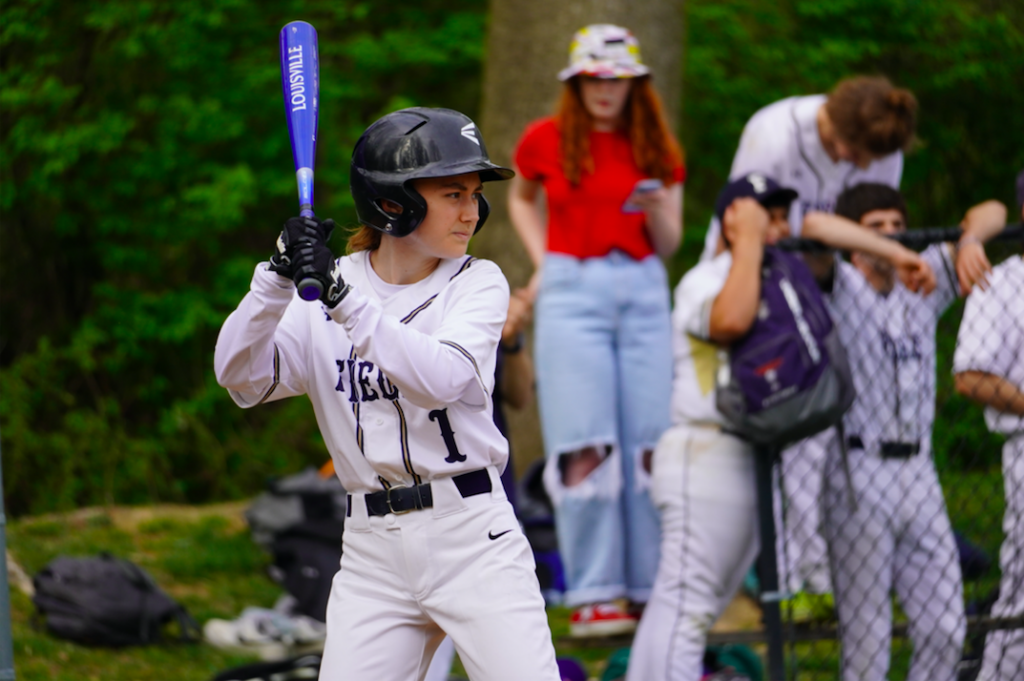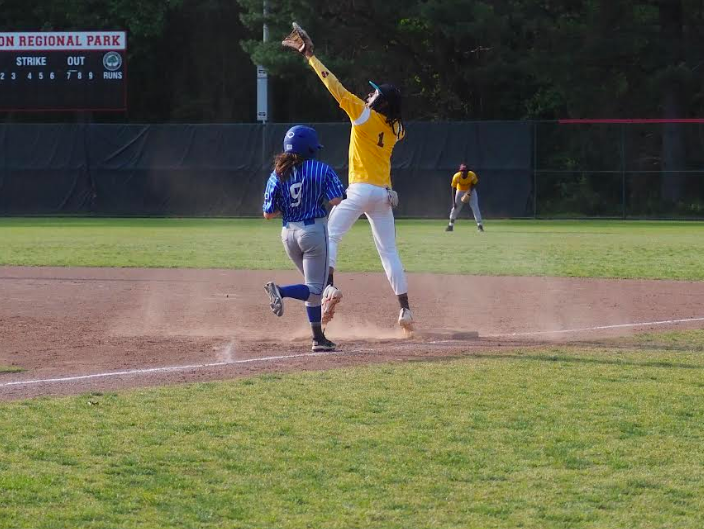By Piper Cherry
Sports has always been a male-dominated industry. Whether it’s who you hear talking over games or who you see debating on post game shows or who is actually playing on the field, more often than not, it is men. Even though there are women’s teams for sports, they hardly get quite as popular as mens, even if they play better.
As time has progressed, people have become more open-minded, and women have broken through the barriers to play roles that were in the past only filled by men. With all of that progress, there are still many areas in need of growth. One particular area of concern is women in baseball.
Baseball is one of the sports where there is not really a “womens” version of it. There is men’s and women’s basketball, men’s and women’s soccer, and then there is baseball and softball. While softball is an amazing sport, it is a very different game from baseball. Most girls that want to play baseball instead resort to softball because they either aren’t allowed to play baseball or don’t have the opportunity to. More than 100,000 girls play youth baseball, but just over 1,000 continue to play through high school. Girls are pushed to switch over to softball, or even another sport entirely, simply because the world doesn’t believe that girls can play baseball.
Many girls in the DMV area, though, have gone against the norm and currently play for their highschool teams as the only girl — including me.

Ella Comfort-Cohen and Maggie Heaphy are two other girls who play baseball in the DMV area for their high school teams – the DC International Dragons and Charlottesville Black Knights respectively. From a young age, they’ve been playing ball, and both got into the sport for similar reasons. Ella, growing up with an older brother, spent a lot of time playing sports with him. When she was five years old, he decided to play baseball and pushed her to join him as well.
“My brother started playing baseball and always wanted me to play since we had both played soccer together before. He encouraged me to try it out and play in Little League. Little did I know I would absolutely fall in love with the sport.”
Maggie has been playing since she was six years old — she was introduced to the sport by her father who used to play.
“I’ve been a fan of baseball my entire life, since my dad played the game growing up. It wasn’t surprising that he would want me to play as well.”
In the younger years of little league teams, girls playing isn’t viewed as out of the ordinary. Maggie explained how “going into Little League, softball never crossed my mind, as it was common to see girls out there at that age.” Ella backed that argument, saying “For most years my teammates didn’t care, we were all young and learning the sport.” As mentioned before, there is generally support for young girls that want to play baseball, rather than softball. But as they get older, that support seems to somewhat dissipate.
“As I kept playing,” Maggie described, “especially at higher levels, lots of both subtle and explicit backlash was a normal thing to deal with.”
The pressure to be a good player becomes painfully apparent the older you get in little league. When I first played baseball, it was much later than Maggie and Ella, which meant that I wasn’t nearly as good as they were at that age. It was difficult because everyone put so much pressure on me to prove myself as a good player, when I had never even played before. Just because I was a girl. I had teammates who were boys that had barely played, but they never felt the same stress that I need about the need to perform perfectly.
Ella recalled how she felt in a similar way, saying “Every mistake I made seemed like a reflection of all women in the sport, so there was a lot of pressure there — only made worse by the fact that I felt isolated from the rest of my team as the only girl who couldn’t relate.”
Since it wasn’t quite as common for girls to still be playing in little league at the age level, I wasn’t greeted by any of the boys when I first joined the team — but my coach approached me enthusiastically, sharing how excited he was that I was joining the team. As that season went on, most of the team didn’t go out of their way to talk to me a bunch, but I had always felt supported by them. Every at bat, I could hear them cheering my name behind me.
High school ball was very different from Little League. Not only was it more competitive — and I was a little behind skillswise having started so late — but most of my high school team was stronger and taller than I was. When you’re the only one who is different from everyone else, it puts a lot of pressure on you to do better. When my teammates made errors, it was okay because it was normal. But when I made errors, it felt like I would always be looked down on and never given playing time again.
I feel extremely lucky, though, to have had such supportive coaches and teammates over my four years of high school ball. I formed close friendships with my teammates fairly quickly — they always backed me up and cheered me on, and didn’t look down on me when I messed up.

Ella and Maggie shared that they also had times when they felt a little down on themselves, but were also lucky to have teams that supported them.
Ella describes her team as a “family”, which rarely isolates her or treats her any differently from the rest of the team. During a past game where her team and mine played against each other, I noticed how her teammates had specialized cheers for all their teammates — including Ella. It was clear that she fit right in.
Maggie enthused, “I have loved playing for my high school team so much! Spending so much time around them has given me the chance to grow with each of my teammates over the years, and I really do love them.”
Playing on the teams isn’t always sunshine and rainbows though. There were times when I felt as though I wasn’t being treated the same as my male teammates by my coaches. More often than everyone else, I found myself sitting on the bench. For the most part of my sophomore and some of my junior years, I spent games keeping the scorebook instead of out on the field just because I knew how to do it. While me being a girl may not have been the sole reason for that, no other boy on the team was ever asked to complete that task — instead, they got their turns starting in games, when I really only got my shot when we were already demolishing the opposing teams and my coaches didn’t want to burn out our starters.
Ella felt a similar way — while her teammates make her feel right at home, sometimes she questions how her coaches treat her based on the fact that she is the only girl, but she tries not to take the choices that they make personally. She spoke about that, saying “Of course, there are times I wonder if my coach makes decisions about fielding based on the fact that I am the only girl, but everyone takes it somewhat personally when they’re benched.” Even though she hasn’t been played all the time, she was still elected co-captain of her team and no one batted an eye at a girl being a leader.
The biggest frustration Ella deals with is opposing teams: “Other teams or spectators sometimes single me out as the only girl out of genuine curiosity or in a romantic/inappropriate manner. It can be annoying when I am simply just trying to play the game I love.”
Maggie shared even having issues within her own team, as well teams she’s played against just like Ella, explaining, “It isn’t always easy and not everyone is supportive. There are always going to be guys on the team that have an issue with me being there and guys in the other dugout chirping and trying to get in my head, but it’s best to just drown it all out.”
With Ella and I being seniors, and Maggie a junior, our times playing highschool ball are coming close to an end. Even with that, all of us are super passionate about staying involved in the sport in some way.
Personally, I may move past playing baseball in college. Instead, I will go into studying sports communication and broadcasting so that I can still stay involved in the sport, rather than continuing to play. Although, I may join a club team if it seems like a supportive atmosphere.
Ella has a different idea of how she wants to pursue her baseball future — hoping to continue to play. She explained, “I hope to continue playing baseball after high school, especially as I am inspired by other teammates who have found opportunities to play in college.” She recognizes, though, that it might be hard, saying, “I do recognize that it is extremely difficult to walk onto a non-inclusive team in college or to start a club level where I could be included.” Even if she can’t continue to play in college, she still wants to stay active. “I will for sure stay involved in the sports world in one way or another, likely through being involved in another sport or working towards personal fitness goals.”
Maggie still has some time left to play in high school, but that doesn’t stop her from thinking about her future in the baseball world. “It’s up in the air if I am to pursue baseball in college or not, but no matter what happens, I always want to be involved with the game.”
Maggie speaks for all of us: “Regardless of my job or the level, baseball remains and will always remain my favorite thing on the planet, and I have absolutely no intention of moving away from it.”

